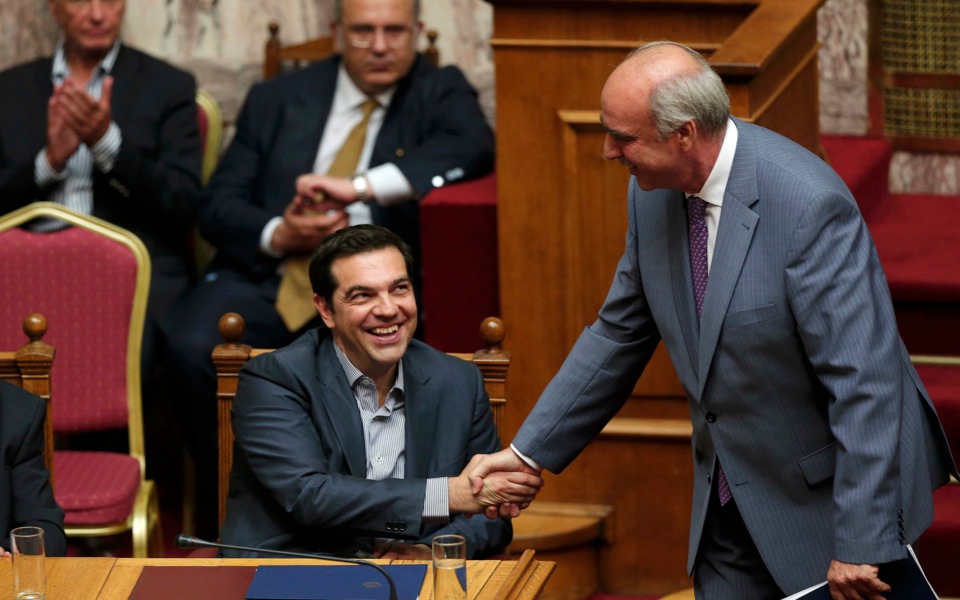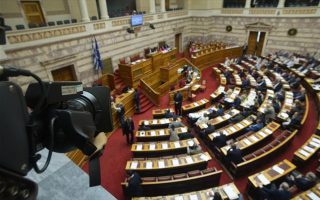Tsipras gets backing; EU, IMF give green light

Greek Prime Minister Alexis Tsipras won backing from lawmakers on Saturday for painful reform proposals aimed at obtaining a new international bailout, but he faced a rebellion in his own party that could threaten his majority in parliament.
The measures, which received an initial green light from the European Union and International Monetary Fund before a crucial meeting of the 19 eurozone finance ministers in Brussels, were passed with the support of pro-European opposition parties.
With Greece's banks shut and completely dependent on a credit lifeline from the European Central Bank, the measures were seen as a last chance to avert financial collapse and prevent Greece from being pushed out of the euro.
Eurozone sources said bailout talks are now very likely after the European Commission, European Central Bank and IMF told eurozone governments after a review of Tsipras's proposals that they were sufficient basis to start negotiating conditional loans from the currency bloc's ESM bailout fund.
But in an ominous sign for the stability of the government, 10 members on the ruling benches abstained or voted against the measures and another seven were absent, leaving Tsipras short of the 151 seats needed for a majority of his own.
Prominent leftwingers in his SYRIZA party signalled before the vote that they could not support the mix of tax hikes and spending cuts proposed by Tsipras, following the rejection of similar austerity measures by voters in Sunday's referendum.
Energy Minister Panagiotis Lafazanis, Deputy Labour Minister Dimitris Stratoulis as well as the speaker of parliament, Zoe Constantopoulou, all called “Present”, in effect abstaining from the vote and withholding their support from the government.
“The government is being totally blackmailed to acquiesce to something which does not reflect what it represents,” Constantopoulou said.
Following the vote, where many leftists in his own party were stunned by his acceptance of previously spurned austerity measures, Tsipras said he would now focus on securing a deal.
“The parliament today gave the government a strong mandate to complete the negotiations and reach an economically viable and socially fair agreement with its partners,” he said.
“The priority now is to have a positive outcome to the negotiations. Everything else in its own time.”
Bailout talks likely
The positive evaluation by the three institutions will form a key part of discussions among eurozone finance ministers when they meet in Brussels at 3 p.m. (1300 GMT).
Leaders from the eurozone and the broader EU are due to meet in Brussels on Sunday. If ministers have agreed to start loan talks, leaders will have no formal decisions to make, but may want to hear more from Tsipras about his plans. Without a deal, they would have to discuss how to contain the fallout a Greek bankruptcy would have on the wider European economy.
After the jubilation in Athens on Sunday following the resounding rejection of further austerity in a referendum, there was bitterness that parliament was being asked to accept a strikingly similar package of measures.
The leader of the right wing Independent Greeks party, the junior coalition party in Tsipras' government, said his lawmakers would back the proposals “with a heavy heart”.
Five members of SYRIZA's hardline Left Platform wing signed a letter saying it would be better to return to the drachma, Greece's pre-euro currency, than to swallow more austerity with no debt write-off.
“The proposals are not compatible with the SYRIZA programme,” Lafazanis, who belongs to the far-left faction, told Reuters before the vote.
Underlining the unhappiness of many on the left at the government's apparent embrace of austerity, a few thousand demonstrators gathered in front of parliament before the vote to protest against the measures.
‘Serious and credible’
Germany, which has contributed more to bailouts than any other country, sounded wary. A finance ministry spokesman ruled out any debt restructuring that would lower its real value.
France, Greece's most powerful supporter in the eurozone, rushed to offer praise. President Francois Hollande called the offer “serious and credible”. Eurogroup head Jeroen Dijsselbloem described it as a “thorough piece of text” but gave no detail.
The euro gained more than 1 percent against the dollar on Friday and European markets rallied on the prospects for a last-ditch deal to keep Greece in the currency area.
U.S. Treasury Secretary Jack Lew said Greece and its creditors appeared to be closer to a deal, calling for an adjustment to Athens' debt burden to ease its cash flow.
A senior EU official said the Eurogroup talks would include discussions on whether Greece needs some debt relief.
Greece asked for 53.5 billion euros ($59 billion) to help cover its debts until 2018, a review of primary surplus targets in the light of the sharp deterioration of its economy, and a “reprofiling” of the country's long-term debt.
In addition to cash from the euro zone, if it makes payments it missed last month to the IMF, the global lender still has a facility to lend Greece some 16 billion euros.
A source close to the matter said the EU/IMF review found that Greece some 74 billion euros in additional financing.
However, a final figure for any new loans will depend on forecasts that take account of measures still to be negotiated.
Any deal would also have to be endorsed by national parliaments including in Germany, which must also formally approve the loan negotiations being started.
Estonia's parliament was the first to give the government conditional authorisation to start talking with Greece.
The latest offer includes defence spending cuts, a timetable for privatising state assets such as Piraeus port and regional airports, hikes in value added tax for hotels and restaurants and slashing a top-up payment for poorer pensioners.
Greek banks have been closed since June 29, when capital controls were imposed and cash withdrawals rationed after the collapse of previous bailout talks. Greece defaulted on an IMF loan repayment and now faces a critical July 20 bond redemption to the ECB, which it cannot make without aid.
The country has had two bailouts worth 240 billion euros from the eurozone and the IMF since 2010, but its economy has shrunk by a quarter, unemployment is at more than 25 percent and one in two young people is out of work.
[Reuters]





